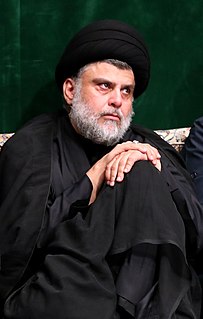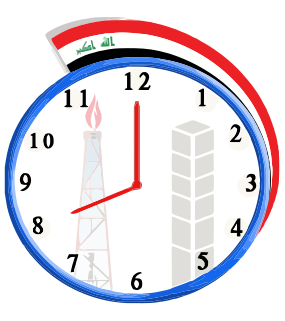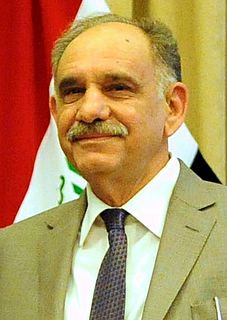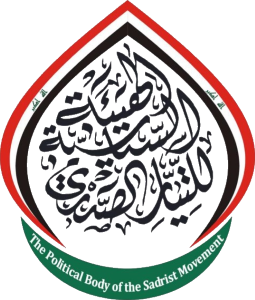Related Research Articles
Iraq is federal parliamentary representative democratic republic. It is a multi-party system whereby the executive power is exercised by the Prime Minister of the Council of Ministers as the head of government, as well as the President of Iraq, and legislative power is vested in the Council of Representatives.

The Islamic Supreme Council of Iraq is an Iraqi Shia Islamist Iraqi political party. It was established in Iran in 1982 by Mohammed Baqir al-Hakim and changed its name to the current Islamic Supreme Council of Iraq in 2007. Its political support comes from Iraq's Shia Muslim community.

Muqtada al-Sadr is an Iraqi Shia scholar, politician and militia leader. He is the leader of the Sadrist Movement and the leader of the Peace Companies, a successor to the militia he had previously led during the American military presence in Iraq, the "Mahdi Army." In 2018, he joined his Sadrist political party to the Saairun alliance, which won the highest number of seats in the 2018 and 2021 Iraqi parliamentary elections.

The National Iraqi Alliance, also known as the Watani List, is an Iraqi electoral coalition that contested the 2010 Iraqi legislative election. The Alliance is mainly composed of Shi'a Islamist parties. The alliance was created by the Supreme Council for Islamic Revolution in Iraq to contest in the January 2005 and December 2005 under the name United Iraqi Alliance, when it included all Iraq's major Shi'a parties. The United Iraqi Alliance won both those of elections however later fell apart after several major parties left the alliance due to disputes with Prime Minister Nouri al-Maliki and the Supreme Council.

Saleh Muhammed al-Mutlaq is an Iraqi politician who is the head of the Iraqi Front for National Dialogue, the fifth largest political list in Iraq's parliament. From 21 December 2010 to 11 August 2015, he was one of the three deputy prime ministers of Iraq.

The Sadrist Movement is an Iraqi Islamic national movement led by Muqtada al-Sadr. The movement draws wide support from across Iraqi society and especially from the Shi'a poor in the country. The most important person in setting the goals and the philosophy of the movement was Grand Ayatollah Mohammad Mohammad Sadeq al-Sadr. A prominent preceding influence had also been Muhammad Baqir al-Sadr. The movement is religious and populist. Its goal is a society ordered by a combination of religious laws and tribal customs.

Osama Abdul Aziz al-Nujaifi or Najifi is an Iraqi politician and served as one of the three vice presidents of the country, from 2014 to 2015 and 2016 to 2018. As the speaker of the Council of Representatives, the informal leader of the moderate Sunni al-Hadba party was the highest ranking Sunni politician of Iraq.
The government of Iraq has established a committee to consider a proposed amendment to the Constitution of Iraq.
Ali al-Shemari is an Iraqi politician from the Sadrist Movement who was the Health Minister of Iraq from May 20, 2006, until April 16, 2007.

Governorate or provincial elections were held in Iraq on 31 January 2009, to replace the local councils in fourteen of the eighteen governorates of Iraq that were elected in the 2005 Iraqi governorate elections. 14,431 candidates, including 3,912 women, contested 440 seats. The candidates came from over 400 parties, 75% of which were newly formed.

Parliamentary elections were held in Iraq on 7 March 2010. The elections decided the 325 members of the Council of Representatives who would elect the prime minister and president. The elections resulted in a partial victory for the Iraqi National Movement, led by former Interim Prime Minister Ayad Allawi, which won 91 seats, making it the largest alliance in the Council. The State of Law Coalition, led by incumbent Prime Minister Nouri Al-Maliki, was the second largest grouping with 89 seats.
This article concerns the formation process of the Al Maliki I Government of Iraq in the aftermath of the Iraq National Assembly being elected on December 15, 2005. Due to disputes over alleged vote-rigging the results of the election were only certified by the Independent Electoral Commission of Iraq on February 10, 2006.
In the aftermath of the 2010 election, great attention was given to the decision on who should be the next Iraqi PM. Both al-Iraqiyya's Allawi and the State of Law coalition's al-Maliki laid claim to the post, so it was seen as up to the Kurdish parties and the Iraqi National Alliance to decide this matter.

Parliamentary elections were held in Iraq on 30 April 2014. The elections decided the 328 members of the Council of Representatives who will in turn elect the Iraqi President and Prime Minister.

Parliamentary elections were held in Iraq on 12 May 2018. The elections decided the 329 members of the Council of Representatives, the country's unicameral legislature, who in turn will elect the Iraqi President and Prime Minister. The Iraqi parliament ordered a manual recount of the results on 6 June 2018. On 10 June 2018, a storage site in Baghdad housing roughly half of the ballots from the May parliamentary election caught fire.

The National Wisdom Movement is a political coalition in Iraq that was formed to contest the 2018 general election. It is led by Ammar al-Hakim, who was previously the leader of the Islamic Supreme Council of Iraq (ISCI).

The Alliance Towards Reforms or Marching Towards Reform, also known by its Arabic short form Saairun, is an Iraqi electoral coalition formed to gain political control in the 2018 general election. The main components are the Shi’a Islamist Sadrist Integrity Party, the leftist Iraqi Communist Party, the Youth Movement for Change Party, the Party of Progress and Reform and the Iraqi Republican Group and the State of Justice Party. The alliance won 54 seats, more than any other coalition in the election.
Dr. Qusay Abdul Wahab al-Suhail is an Iraqi politician from the Sadrist Movement who is the current Minister of Higher Education in the Government of Adil Abdul-Mahdi.

The 2022 Speaker of the Lebanese Parliament election was an election to elect the speaker of the 24th Lebanese Parliament. It was 7th legislative speaker election since the implementation of the Taif Agreement in 1989.

Since the parliamentary election in October 2021, there has been a political crisis in Iraq, with members of the Council of Representatives of Iraq being able to form a stable coalition government, or elect a new President. For 8 months the national political system has been in a political deadlock.
References
- ↑ "Iraqi lawmakers elect Sadrist MP Hakim al-Zamili as first deputy speaker". Kurdistan24. 9 January 2022.
- ↑ See Civil war in Iraq for more details
- ↑ "Kidnappers seize Iraqi minister". 19 November 2006.
- ↑ THE REACH OF WAR; Iraq's No. 2 Health Official Is Held and Accused of Financing Shiite Militants
- ↑ Hakim al-Zamili: Accused death squad chief turned INA parliamentary candidate Archived 2011-08-07 at the Wayback Machine , KurdishMedia , 2010-03-05
- ↑ Iraqi Premier Wants Trial of 2 Shiites in Killings
- ↑ "Iraq's Sadrists demand U.S. release former minister". March 4, 2008. Washington Post .
- ↑ Murky Candidacy Stokes Iraq’s Sectarian Fears, New York Times , 2010-03-10
- ↑ Victors In Iraqi Elections Include Suspected Murderers
- ↑ Parliament Agrees on Committees, But Not on Their Leaders, Reidar Visser , 2011-01-17
- ↑ Murky Candidacy Stokes Iraq’s Sectarian Fears
- ↑ "Iraq: Turkey troops near Mosul violating international law". Al Arabiya News. 2015-12-05. Retrieved 2015-12-05.
- ↑ "KDP puts forth candidate for deputy parliament speaker". Rudaw. 10 January 2022. Retrieved 10 January 2022.